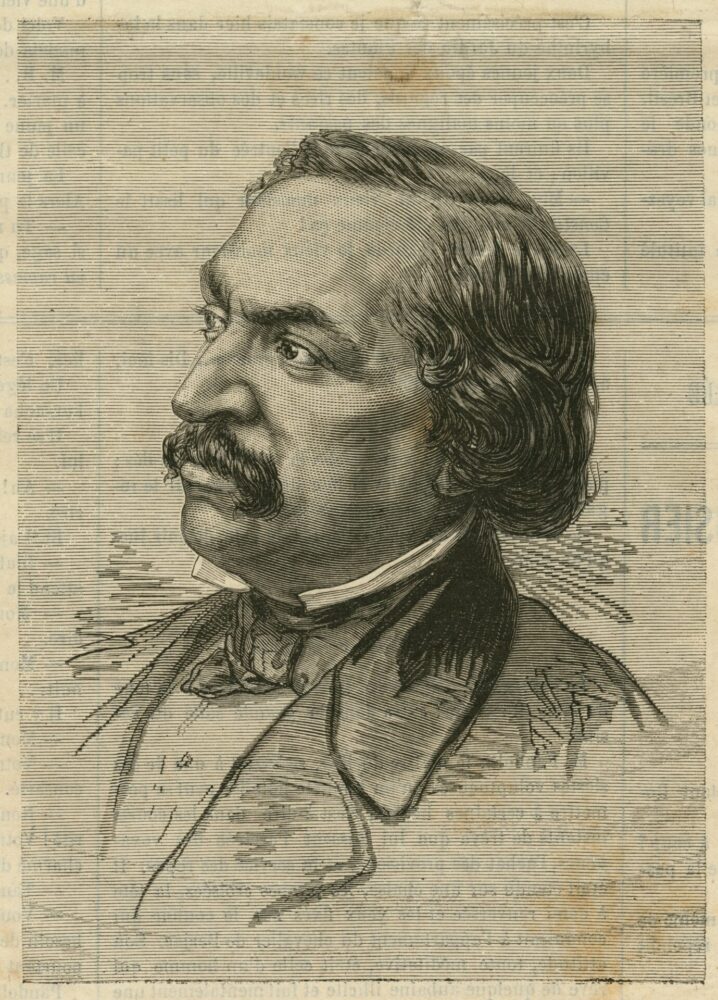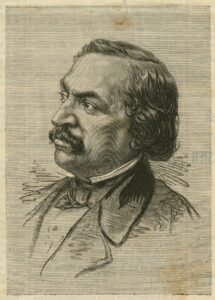Victor Séjour
Victor Séjour’s 1837 story “Le Mulâtre” is considered the first work of published fiction by an African American writer.

The Historic New Orleans Collection
Portrait of Victor Séjour from La Presse Illustrée
Born in New Orleans in 1817, Victor Séjour became Louisiana’s most famous expatriate among the numerous gens de couleur, or free people of color, during the nineteenth century who sought a better life in France free from racial oppression. From the 1840s to the 1870s, he penned more than twenty plays staged in prestigious Parisian venues, many to popular and critical acclaim. Though most of Séjour’s works dealt with social justice, only a short story written in his youth directly tackled the issue of slavery.
Background and Early Life
In many ways Séjour’s early life reflected the situation of the gens de couleur in the years following Louisiana statehood in 1812. Mostly French-speaking Creoles, Louisiana’s free Black community numbered around eleven thousand, or approximately 7 percent of the total population, in 1820. Though restricted in their political rights and subject to racist laws and treatment, free people of color excelled in many trades and professions while developing their own institutions, undertaking cultural endeavors, and engaging in intellectual pursuits. Some, like Victor Séjour’s family, even practiced slavery, albeit generally in a milder form.
Séjour’s mother, Héloïse-Philippe Ferrand, a Louisiana native and free woman of color, met his father, Louis Séjour, shortly after the latter’s arrival as a refugee from the Haitian Revolution. Though not married at the time of their first son’s birth in 1811 nor of Victor’s, they lived as a couple and eventually wed in 1825. A tailor and shopkeeper, Louis Séjour fought in the Battle of New Orleans. The young Victor spent his childhood in the French Quarter, where he attended the Académie Sainte-Barbe, a French-language school for children of color whose principal was Michel Séligny, himself a talented and well-respected writer, who “must have been the major influence in the formative years of Victor Séjour,” posits biographer Charles E. O’Neill.
Literary Stirrings, from New Orleans to Paris
At seventeen the young Victor first drew attention to his literary abilities upon reading a poem before the Société des Artisans, a social and intellectual club. However, his emergence as a writer coincided with increasingly oppressive conditions against all of Louisiana’s Afro-descended people, whether enslaved or free. In the mid-1830s Séjour moved to Paris in search of brighter horizons with his family’s support, to a country where racial equality had recently been enshrined in law—although slavery continued to exist in France’s overseas colonies.
Little is known of Séjour’s activities in Paris until the publication of his short story “Le Mulâtre” (“The Mulatto”) in March 1837. Appearing in the Revue des colonies, a journal founded by Cyril Bissette, a radical Martinican of color, “Le Mulâtre” weaves a gruesome tale of revenge set in colonial-era Saint-Domingue, or Haiti. The protagonist, Georges, an enslaved man of mixed racial background, saves the life of his master, Alfred, but the latter grows enamored with Georges’s wife, Zelia. She is subsequently hanged for refusing Alfred’s advances. Ultimately Georges avenges Zelia’s death only to discover, just as he decapitates Alfred, that his master is also his father. A searing indictment of the evils of slavery, Séjour’s story is considered the first work of published fiction by an African American writer.
Though it is uncertain whether “Le Mulâtre” provoked much reaction, Séjour made waves in 1841 with a poem offering a nostalgic tribute to France’s fallen emperor, Napoléon I.
This poem, entitled “Le retour de Napoléon” (“The Return of Napoleon”), was republished in New Orleans in 1845 as part of Les Cenelles: choix de poésies indigènes, or, in English, Mayhaws: A Selection of Native Poetry, the very first anthology of Black American writers.
A Voice of Conscience on the French Stage
Séjour’s breakthrough as a playwright came with the verse drama Diégarias, produced in 1844 at the illustrious Théâtre Français (or Comédie-Française) and later staged in New Orleans. Set in fifteenth-century Castille, the play explored themes of identity and prejudice through the tragic fate of a Jewish advisor to a Catholic monarch. Diégarias reflected the influences of literary Romanticism, especially French writers like Victor Hugo, and the ethical concerns of the Age of Emancipation. In this and subsequent works of social and political protest, Séjour gave voice, as he expressed in a letter, to “my convictions and the stirrings of my indignant conscience.”
Séjour’s career spanned three decades. His success was crowned in the 1850s by works that drew on the conventions of melodrama and earned him the moniker “this Shakespeare of the boulevard.” Some of his best-known plays were Richard III (1852), an adaptation of the English bard’s classic tragedy; Le Fils de la Nuit (1856); Le Martyre du cœur (1858), co-authored with Jules Brésil, his only play with a major Black character, a Jamaican; La Tireuse de cartes (1859); and Les Massacres de la Syrie (1860). Séjour’s glory days coincided with the authoritarian regime of Emperor Napoléon III, an admirer of the Louisiana playwright’s work and regular attendee of their showings. Indeed, the Emperor’s personal secretary, Jean-François Mocquard, collaborated with Séjour on La Tireuse de cartes, or “The Fortune Teller.” Rife with contemporary political implications, this play was based on the Mortara case, an international scandal involving a Jewish child kidnapped and raised as a Christian in the Papal States on the Italian Peninsula.
By the mid-1860s, Séjour’s star began to wane as literary tastes shifted from Romantic idealism to the grittier visions of Realism and Naturalism. Nonetheless, several of his earlier hits were revived, and he continued to write until his death from tuberculosis at fifty-seven.
Victor Séjour’s Legacy
Like the more famous Alexandre Dumas, also of African heritage through his father, Victor Séjour, a free man of color from New Orleans, left a mark on France’s cultural scene, though his racial identity was not a major element of his artistic persona. Popular in the author’s time, some of his plays inspired adaptations in other languages, especially La Tireuse de cartes. However, Séjour’s works often met with mixed critical reviews, and after his death, his plays did not generate a substantive reaction from literary scholars. Since the late twentieth century, his writings have attracted renewed interest. “Le Mulâtre” has been hailed as a pioneering work of fiction, and some of his dramas have been translated into English.
